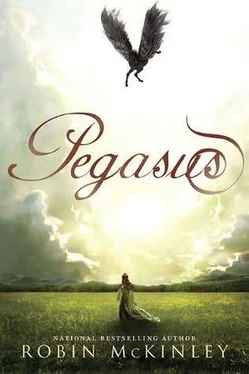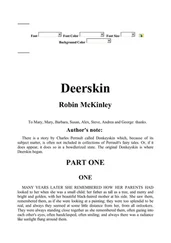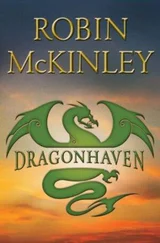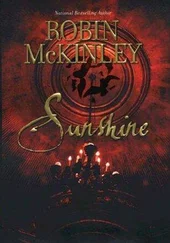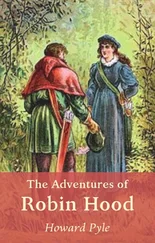There was her father, wearing one of the long sparkly king robes—and even the Sword at his side!—hand in hand with her mother, who was wearing a sparkly queen robe; a step behind the queen was Hirishy. Two of her brothers were there, wearing gold chains round their necks and dress swords at their sides. Danacor was missing. She felt a brief flicker of fear—don’t be silly, she thought, he’s often gone—and then the pegasi were gliding down the last little way—they were cantering with barely a jolt to their passenger—trotting—walking. She pulled her laces free, ready to stand up as gracefully as she could.
One of the footmen had come quickly forward, and he was beside her almost as soon as the drai had fallen to the ground. It was Glarfin, and he was smiling and trying not to smile, because smiling wasn’t grand enough. When he caught her eye, however, the smile broke out anyway, and he mouthed “Welcome home, lady” at her. She grinned and murmured, “ Thank you, lieutenant.” He had a robe over his arm and he unfolded it gravely, and then flung it round her shoulders in a highly practised court attendant’s gesture. Court robes tended to have monumental armholes, so she managed to slip her arms through them without finding herself trying to make her elbow touch her ear, or scrabbling at it like a cat clawing curtains. Glarfin, pretending to do nothing, delicately held the collar till Sylvi had it settled across her shoulders.
The robe, she saw, was one of her mother’s—the one that was Sylvi’s favourite, stitched all over with golden topazes. It had been her mother’s mother’s, and her mother’s mother’s aunt’s, and the aunt’s mother’s, who had also been married to the king. It’ll be too long, she thought anxiously, but it wasn’t; it had been taken up for her. Surreptitiously she wiggled her fingers; the sleeves had been shortened as well. She put her foot out and the hem poured topazes over it; she crossed her arms with a flourish, watching the topazes sparkle and then threw her arms wide again as her mother put her arms around her and whispered, “Welcome home, and happy birthday, darling.” Then her father hugged her too, and for a moment she forgot about both topazes and pegasi, as she felt her parents’ arms around her for the first time in three weeks. Her brothers saluted her formally, Oyry and Poih at their shoulders, but Garren caught her eye long enough to give a quick flick and twist with his left hand, which had meant “let’s run away” to generations of royal children: it was a slight revision of the formal sign of hospitality made to pegasi attending any official gathering.
She saw that Lrrianay, who had flown back to the palace with her drai-bearers, was standing just behind her father’s shoulder, and she was suddenly angry that Lrrianay should always stand behind her father. They were bondmates, and Lrrianay was also king of his people, and no subject to anyone. She swept into exactly the same bow to Lrrianay that she would give to her father, the bow of a princess to a king. Lrrianay gravely returned her bow, and the flowers (somewhat wind-blown) that Niahi had plaited into his mane that morning twinkled at her.
Next the senators wished to be presented to her. She was surrounded by humans —swaying on their queer feet as they walked, their extraordinary quantities of clothing flapping and fluttering both with and counter to their bizarre motion. There were no brown-and-grey-and-gold-and-white horizontal backs to look over, no silky banners of mane and tail for the sun to shine through. And humans were all so tall. Involuntarily she took another step backward—and bumped into Glarfin.
He moved out of her way so quickly no one but the two of them knew it had happened. “My lady?” he said, very quietly.
“ Senators ,” she hissed. “And everyone is so tall. ” The senators were forming a queue; the first would be bowing to her in only a moment.
“I am standing behind you,” said Glarfin. “And I am taller than any of them.”
She suppressed a little hiccup of laughter, but it meant that she was smiling when the first senator was presented. Last of all was Senator Orflung—wearing an orange sash. To him she dared say, “Thank you for asking me if I wanted to go.”
“It was a—valuable experience, think you?” he replied.
“Yes, my sir, I believe it was valuable.”
She had guessed she would be expected to make a few sentences’ worth of speech, and so had spent some of the morning’s flight slowly putting words together while the wind hummed in her ears and the landscape flashed away beneath her—but she was only thinking of having to do it, of being prepared. Yet she hadn’t been prepared: she hadn’t expected footmen and a topaz-sewn robe—and the senators. She hadn’t expected so many swaying, flapping, confusing, chattering humans to greet her return. She hadn’t expected to find humanity so confusing.
Nor had she thought of how strange it would be to be back at the palace again. Most years she visited one or another set of her cousins for several weeks—but then her aunts’ and her uncles’ families were human—like her. Now it was very strange, standing on the Great Court dais to say her few little words, looking out at all the human faces, hearing the human sounds (she had forgotten how noisy humans are; she had forgotten how much noise always speaking out loud makes) and smelling the human smells. She had to concentrate on the words she was saying. (“It was a clear blue day when I left three weeks ago and it is another clear blue day for me to come home on: give me leave, please, to see this as a reflection of everything that has happened.... The pegasus country is beautiful and the pegasi have been nothing but kind and generous to me.”) She had to wrench her mind away from how odd this business of saying a few almost meaningless words to a crowd was—and how she hadn’t done it the night before, her last night in Rhiandomeer. And she had to stop herself, as soon as she had finished speaking (“Thank you all for your welcome; I have missed you all very much”), from looking round for a group of pegasi she could, with Ebon, go and stand with.
Except they were in her father’s palace, and here the pegasi rarely stood in a group; they stood individually, each with the human to whom they were bound. The other five of the six pegasi who had carried her drai, she eventually realised, had not come into the Great Court with her, but had gone at once to the wing of the palace that was the pegasi’s own. The only pegasi here now were bound: Lrrianay, Hirishy, Ebon, Poih, Oyry; four of the senators had pegasi; several of the blood courtiers present did also.
And all these pegasi had stayed well back as the humans greeted the returning human princess; they had, when necessary, bowed, letting their long forelocks sweep forward and not meeting her eyes. She did not try to speak to any of them—she did not think about choosing not to try to speak to them....
She did not dare reach out to Ebon, standing almost beside her, only a little behind her, which is what she wanted to do. But when her father came up to stand beside her again, she reached out for his hand and squeezed it almost desperately. The clouds she had seen in the distance during the flight home seemed to be racing toward her, grey and cold.
When Ebon left the next morning she could hardly bear it.
She knew it was coming; they had said their real good-byes the night before, but she and her father and a few of the courtiers went out in the cool wet dawn to watch the pegasi spread their wings and leap into the air. Usually there was no formal leave-taking, but this time, her father said, was special, and so the humans would see the pegasi off; but he looked at his daughter with worry in his eyes.
Читать дальше
